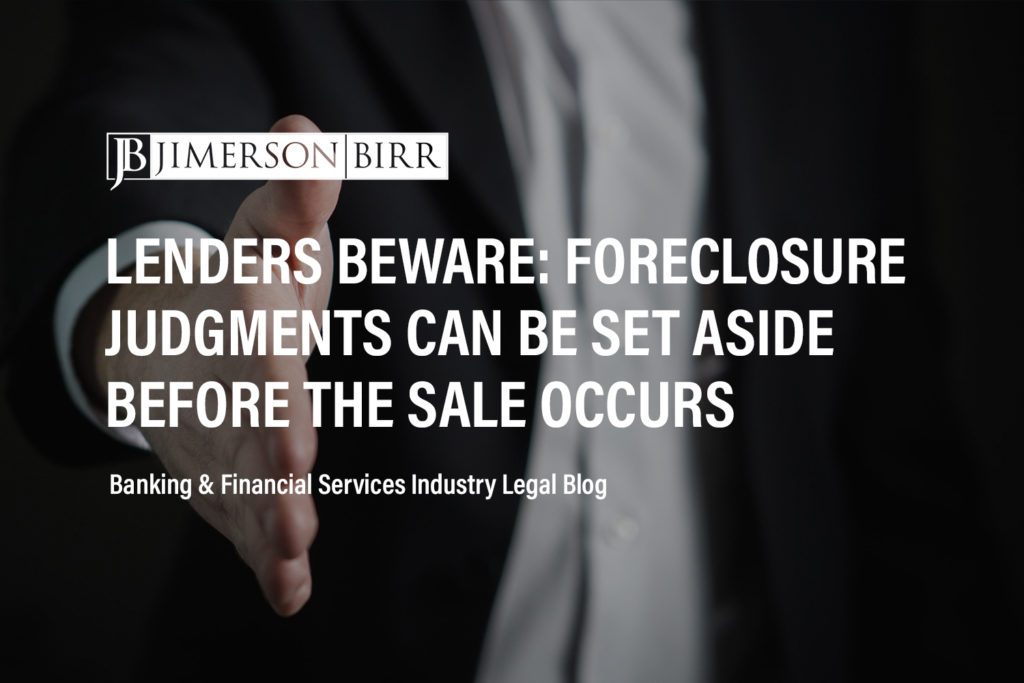Although a lender may have won the battle by obtaining a final judgment of foreclosure from the court, it may not win the war. Pursuant to Section 702.07 of the Florida Statutes, the circuit courts have the “power and authority to rescind, vacate, and set aside a decree of foreclosure of a mortgage of property at any time before the sale has been actually made” and may “dismiss the foreclosure proceeding on the payment of all court costs.” Although a lender may not be able to avoid this from happening, it should be aware of how and why their final judgment of foreclosure may be set aside.
Why Would a Final Judgment of Foreclosure be Set Aside?
A final judgment of foreclosure may be set aside for any of the following reasons:
- Mistake, inadvertence, surprise, or excusable neglect;
- Newly discovered evidence which by due diligence could not have been discovered in time to move for a new trial or rehearing;
- Fraud, misrepresentation, or other misconduct of an adverse party;
- The judgment is void;
- The judgment has been satisfied, released, or discharged, or a prior judgment upon which it is based has been reversed or otherwise vacated, or it is no longer equitable that the judgment should have prospective application.
Fla. R. Civ. P. 1.540(b); Toler v. Bank of Am.. Nat. Ass’n, 78 So. 3d 699, 703 (Fla. 4th DCA 2012) (“[Section 702.07] and Rule 1.540 should be read together, so that, as in other civil cases, Rule 1.540 provides the avenue for relief from a judgment of foreclosure.”).
For example, if the court entered a final judgment of foreclosure after the borrower filed a petition for bankruptcy in federal court, the judgment will be void and therefore, must be set aside. Citibank, N.A. v. Unknown Heirs, 197 So. 3d 1214, 1215 (Fla. 1st DCA 2016) (The final judgment of foreclosure was vacated because the judgment “was entered the day after the defendant/debtor’s petition for bankruptcy was filed in federal court,” therefore, the judgment was void.”).
What Happens if The Final Judgment of Foreclosure is Set Aside?
In the event the circuit court rescinds, vacates, or sets aside a final judgment of foreclosure, the mortgage, together with its lien, will be “completely relieved of all effects of any kind whatsoever resulting from or on account of the foreclosure proceedings” and “fully restored in all respects to the original status of the same as it existed prior to the foreclosure proceedings and the decree of foreclosure.” Fla. Stat. § 702.08. In other words, the mortgage and the lien will return just as if foreclosure proceedings had never been instituted and a decree of foreclosure had never been made.
What Happens If the Court Denies The Borrower’s Motion to Set Aside the Final Judgment of Foreclosure?
Unfortunately for lenders, the borrower may have one more kick at the can, if the court denies its motion to have the final judgment of foreclosure rescinded, vacated, or set aside. If the court makes an order denying the borrower’s request to have the final judgment of foreclosure rescinded, vacated, or set aside, the borrower is able to appeal that order pursuant to Rule 9.130(5) of the Florida Rules of Appellate Procedure. Citibank, N.A., 197 So. 3d at 1215 (Fla. 1st DCA 2016) (“The order denying the motion to vacate is an appealable final order under rule 9.130(5), Florida Rules of Appellate Procedure”).
Therefore, even if the lender obtains a final judgment of foreclosure from the court and the borrower’s motion to have the judgment set aside is denied, the borrower will be able to appeal the order denying its motion to the appropriate district court. There is a chance that the final judgment of foreclosure may be rescinded, vacated, or set aside by the district court for any of the reasons listed in Rule 1.540(b) of the Florida Rules of Civil Procedure.
Conclusion
If a lender obtains a final judgment of foreclosure from the court, there is a chance that the judgment may be set aside at any time before the foreclosure sale. The borrower may make a motion to the circuit court to have the judgment rescinded, vacated, or set aside, and have the foreclosure proceeding dismissed. In the event the circuit court denies the borrower’s motion, the borrower will have another chance to have the judgment set aside by appealing the circuit court’s order to the district court.
Authors:
Continued reading:
- What Lenders Need to Know About the Equitable Nature of Mortgage Foreclosures
- What Lenders Need to Know About § 702.036 and the Finality of Foreclosure Sales


